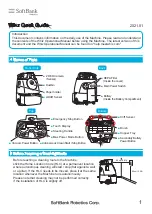
Follow these steps to connect the 2 DOF Planar Robot system:
1. Make sure that your data acquisition device is installed and is operational. For example, if using the Quanser
Q2-USB see Reference [1].
2. Make sure everything is powered off before making any of these connections. This includes turning off your
PC and the amplifier.
3. Connect one end of the 2xRCA to 2xRCA cable from the Analog Output Channel #0 on the terminal board to
the
Amplifier Command #0
connector on the amplifier, i.e., use both white or both red RCA connectors. See
cable #1 shown in Figure 4.1.
4. Connect the other 2xRCA to 2xRCA cable from the Analog Output Channel #1 on the terminal board to the
Amplifier Command #1
connector on the amplifier, i.e., use both white or both red RCA connectors. See cable
#2 shown in Figure 4.1.
5. Connect one 4-pin-stereo-DIN to 2-pin locking cable that is labeled from
To Load #0
on the amplifier to the
Left
Motor
connector on the 2 DOF Planar Robot. See connection #3 shown in Figure 4.1.
6. Connect the other 4-pin-stereo-DIN to 2-pin locking cable that is labeled from
To Load #1
on the amplifier to
the
Right Motor
connector on the 2 DOF Planar Robot. See connection #4 shown in Figure 4.1.
7. Connect the 5-pin-stereo-DIN to 5-pin-stereo-DIN cable from the
Left Encoder
connector on the 2 DOF Planar
Robot panel to Encoder Input # 0 on the terminal board, as depicted by connection #5 in Figure 4.1.
8. Connect the 5-pin-stereo-DIN to 5-pin-stereo-DIN cable from the
Right Encoder
connector on the 2 DOF Planar
Robot panel to Encoder Input # 1 on the terminal board, as depicted by connection #6 in Figure 4.1.
Caution:
Any encoder should be directly connected to the data-acquisition terminal board (or equivalent)
using a standard 5-pin DIN cable.
DO NOT connect the encoder cable to the amplifier!
9. Connect the
Digital I/O
connector on the 2 DOF Planar Robot to the Digital Output header on the terminal
board using the ribbon cable. See connection #7 in Figure 4.1. This carries the solonoid command signal.
4.3 Connections using a Two-Channel Voltage
Amplifier
This section describes the wiring required for a voltage amplifier that has two channels, e.g., such as the Quanser
VoltPAQ-X2. The connections are illustrated in Figure 4.2 and are the same as given above in Table 4.2.
Note:
The wiring diagram shown in Figure 4.1 is using a generic data acquisition device. The same connections
can be applied for any data acquisition system that has least 2x analog outputs, 1 x digital output, and 2x encoder
input.
2 DOF PLANAR ROBOT User Manual
14



































